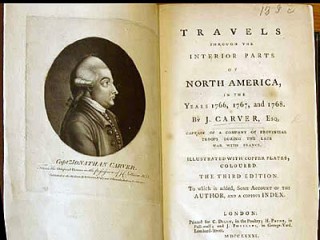
Jonathan Carver biography
Date of birth : 1710-04-13
Date of death : 1780-01-31
Birthplace : Weymouth, Massachussetts, U.S.
Nationality : American
Category : Historian personalities
Last modified : 2011-08-09
Credited as : Explorer, writer,
The American explorer and writer Jonathan Carver was one of the most famous travelers and travel writers of the 18th century.
Jonathan Carver was born on April 13, 1710, in Weymouth, Mass. The family moved to Canterbury, Conn., when Jonathan was a child. He entered military service in the French and Indian War as a sergeant and was wounded in 1757 in the horrible siege of Ft. William Henry, which became synonymous on the frontier with "atrocity." Two years later Carver was promoted to lieutenant and was raised to captain of a Massachusetts regiment the following year. Gen. Thomas Gage, particularly, thought highly of Carver's military ability.
When the French and Indian War ended, Carver began the travels which made him famous in America and Europe. He started from Boston and made his way to the British frontier post of Mackinac, where the commandant, Robert Rogers (of Rogers' Rangers fame), encouraged him and supplied trade goods to be used as presents for the Native Americans through whose country he would be traveling. Carver ascended the Mississippi River to the mouth of the Minnesota, which he then followed. He eventually reached Lake Superior and spent several months on its northern and eastern margins, exploring its bays and the rivers which entered the lake. He returned to Mackinac in 1767.
During the following year Carver took the journal of his wilderness travels to Boston in hopes of having it published. Disappointed, he sailed for London to announce his discoveries to the world. In England he petitioned the King for reimbursement of the money he had spent in his explorations. The result was an examination by the Board of Trade, which granted him permission to publish his journal. Although it was quite popular, the sales were insufficient to support him, and he had to take other work, such as clerking in a lottery office.
Carver remained in England the rest of his life, remarrying there though he had never bothered to divorce the wife he had left in America. He spent most of his time writing or trying to get more of his writings published.
His Travels through the Interior Parts of North America (1778) ran through numerous editions and was translated into foreign languages, becoming one of the most popular early travel accounts of America. But because Carver padded his journals with a section of information on Native American customs garnered from other authors, whom he did not identify, he was charged with plagiarism, and his reputation as both writer and explorer suffered. During 1778-1779 he lent his name to a work titled The New Universal Geography and wrote a technical work, Treatise on the Culture of the Tobacco Plant, but these books did not enjoy the sales of his Travels.
Carver died destitute on Jan. 31, 1780, and his English wife buried him in a paupers' field. His reputation has been hounded by charges of fictionalizing and plagiarism. Even today, historians are laboring to restore his once high standing.
















